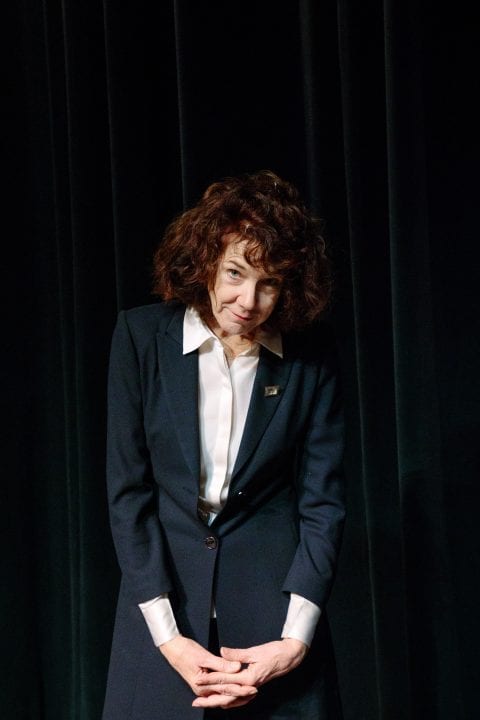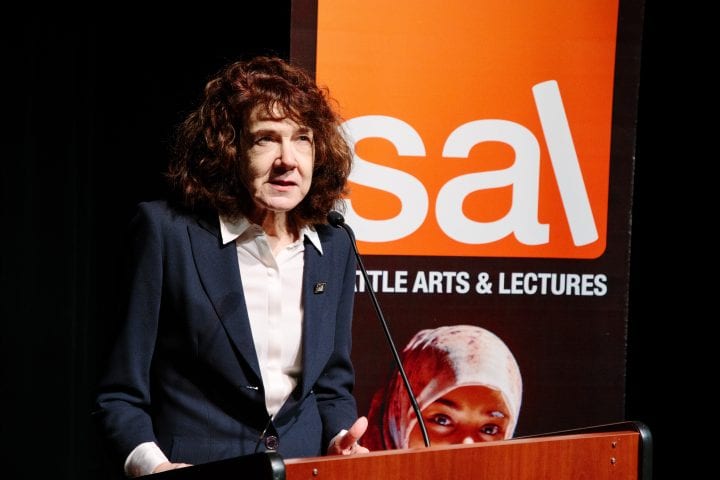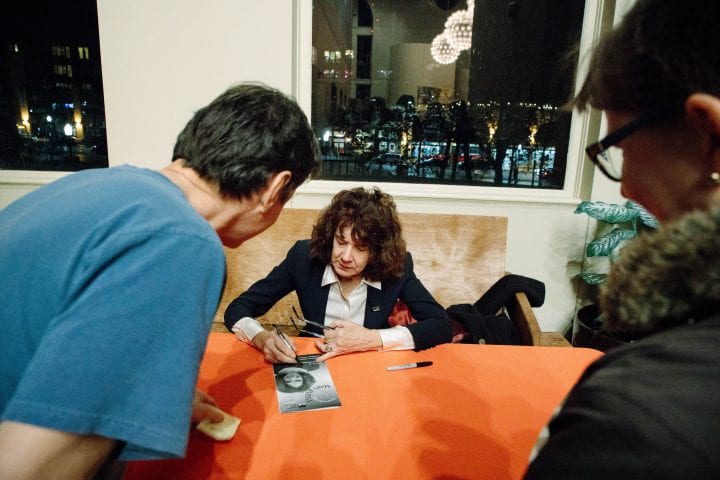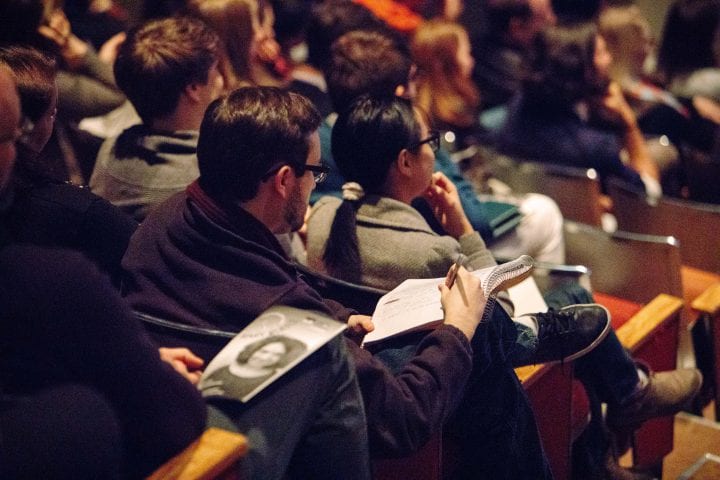
Mary Ruefle: Impressions of a Sentence-Maker
December 13, 2019
By Bianca Glinskas
As an emerging poet, I’ve been a bit clueless when it comes to considering how profoundly my writing process affects my work. I type in front of screens in noisy cafes. I am guilty of planning my poems out before I write them. For me, this has served as a sort of safety net which protects me from becoming overwhelmed by the limitless possibilities of writing. I am afraid of heights—and free-falling. This, along with writing prompts, after poems, and style-mimicry, have been like using bumpers and ramps while bowling. My writing has a propensity for density as a result; it easily becomes loud, cluttered by distractions. I often become stuck in my subject matter, lacking the wind’s favor.
To counteract this, I look to writers like Mary Ruefle, who I saw read for Seattle Arts & Lectures at Broadway Performance Hall on November 21. Mary’s discussion of her creative process and writing philosophy that evening impressed upon me the importance of intuition. “I write a great many [poems] in my head while driving,” she shared. “Well, I write all of them in my head.” This unplugged approach is smart, simple; it produces poems which capture the very conditions of their creation.

Following Mary’s reading, I’ve been thinking about how the relationship between the writing process and the poem is like an object in a mirror. How I write is reflected in what I write. The more I’ve thought about my current writing process, the more I’ve realized all of my poems were suffering—the process of a poem becoming a poem is more than its creative drive and content. The process is where the magic happens, and it requires the utmost attention. Some spells require rituals with full moons and special ingredients. Why not writing?
Some spells require rituals with full moons and special ingredients. Why not writing?
When Mary spoke about the spontaneous nature of her work, she offered, “I don’t write poetry with intent.” This stream-of-consciousness style struck me as brave and straightforward, intention through intuition. Mary said that her poetry is moved by language, and by “looking around the room,” an organic idea-farming method.
“Looking around the room,” she clarified, is not the literal sense of looking at the physical objects in her immediate surroundings. It is a view with a larger scope, one which looks outward as it looks inward. Her self-assured surrender has opened my mind’s eye to the possibility of how to hack my own work—how to better access my writing, improve my material and, as a result, better tap into my potential as a poet.

And so, I started writing poems in the car: driving to work, yoga, the grocery store. I nearly forgot them entirely by the time I got home to my keyboard, but a line, a thought, a phrase here and there stuck with me. From these fragments, I found the step that is vital to finding fledgling material: room for discovery.
That evening, Mary said: “Don’t try to sound like the people you love because what you really love about them is that they’re being themselves. So, the best way to imitate them is not to sound like them, but to sound like yourself.” While my process doesn’t, and likely won’t ever, look much like Mary’s, trying on her methodology has given me insight into how to improve my own process, and how to form my own personal writing philosophy.
While my process doesn’t, and likely won’t ever, look much like Mary’s, learning about and trying on her methodology has given me insight into how to improve my own process, and how to form my own personal writing philosophy.
Mary’s way of looking at the world is contagious, and necessary. I have found that when I return to the world after reading Mary’s writing, my eyes are widened by an inquisitive, imaginative impulse, a sort of Holmesian shift in perception. Oddly enough, the enigmatic nature of Mary’s work reminds me of Koans, a Buddhist genre that is inspired by improvisation and composed during competitive “literary games.” Koans are intended to quiet the ego and let the listener temporarily abandon their logical mind. Here is an example: Question: What is the Buddha? Answer: Three pounds of flax.
I have found that when I return to the world after reading Mary’s writing, my eyes are widened by an inquisitive, imaginative impulse, a sort of Holmesian shift in perception.

This feels so abstract; we react, firstly, as logical thinkers, confused by the absurdity. Then, we look again, a sort of reader’s double-take. We can only enjoy the experience if we are able to let go of rational thought and accept the randomness. There is a lesson to learn, but it is not so straightforward as we might be used to. Mary’s poetry does the same trick. She read from an untitled poem: “I dreamt three dimensional objects were politically incorrect . . . People were trying to flatten their belongings, someone was stepping on a pencil.” She disarms our preconceptions of what to expect from a poem in order to surprise, delight, and allow us to intuit her ideas.
At one point during the reading, her poetry made an allusion to Proust’s madeleine, a cookie which inspired a flashback which lasts for thousands of pages: “There is a potato on a table . . . I stare at it and then write a novel.” Mary’s perspective is one we fiercely need: a willingness to stare at the smaller invisible details in life, jumping-off points for the meditative leap inward, and an ability to stick our tongues in our cheeks every once in a while as we do, too.
Mary’s perspective is one we fiercely need: a willingness to stare at the smaller invisible details in life, jumping-off points for the meditative leap inward, and an ability to stick our tongues in our cheeks every once in a while as we do, too.

That November night, Mary described herself as “a sentence-maker.” This, too, stuck with me, and weeks after the event, is still sinking in. Mary’s language here was concise, declarative, absolute. What intrigues me most about this declaration is the implied power behind the claim: sentences are like the gears which work the machinery of literature. When these gears spin, our internal tedium responds; it trembles and shifts. A relationship is formed; the revolution of the gears causes the evolution of our inner landscape. Language is movement, transformation through transportation.
To be a sentence-maker, then, I believe, is to be a leader, a revolutionary on an intimate, inward scale—and I know I am certainly a changed person and poet as a result of Mary’s.
Bianca Glinskas is an emerging poet and literary journalist living in Seattle. She currently writes for Adroit Journal & Drizzle Review. Bianca hopes to complete an MFA in Poetry in the coming years.